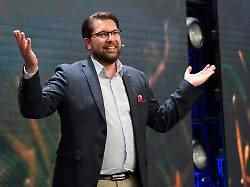Shift to the right in Sweden
Can the far-right convince the moderates?
09/15/2022, 6:53 p.m
After the government alliance in Sweden was voted out, the Liberals, Christian Democrats and ultra-right Sweden Democrats are looking for enough common ground to form an effective coalition. Success is not taken for granted. The resigned Prime Minister offers an alternative.
After the success of the ultra-right Sweden Democrats in the parliamentary elections in Sweden, there are signs that it will be difficult to form a government. Parliament President Andreas Norlen invited the party leaders to talks in the coming week. After that, he wants to entrust the moderate leader Ulf Kristersson with forming a government. Its allies, the Sweden Democrats, are making clear claims to power after their strong showing. The previous Prime Minister Magdalena Andersson meanwhile offered Kristersson a cooperation.
After announcing the right-wing camp’s election victory on Wednesday evening, Kristersson declared that he wanted to start forming a new and strong government immediately. “Now we will restore order in Sweden!” he wrote on Facebook. He will now have to pull off the feat of persuading the Liberals and Christian Democrats that the nationalist Sweden Democrats might participate in the government.
Not all members of his legal alliance are as open to this scenario as Kristersson. The Liberals have already announced that they want to withdraw their support from the 58-year-old if he brings the right-wing nationalists to the cabinet table.
Giving up posts to gain power?
Former Prime Minister Andersson, who submitted her resignation, warned that the Sweden Democrats’ strong election result could legitimize and increase the risk of “hatred, threats and violence”. She is willing to work with Kristersson to rule out such a scenario. “If the moderates change their minds and want to work with me instead of the far-right, my door is open,” Andersson said.
The nationalist Sweden Democrats were the big winners with more than 20 percent of the votes and rose to become the country’s second-strongest party – even ahead of Kristersson’s moderate coalition party. Sweden Democrat leader Jimmie Akesson laid claim to cabinet posts as early as election night; however, in exchange for meeting some of his party’s demands, he can imagine not being directly involved in the government but supporting it informally.
In that case, the Sweden Democrats would be able to heavily influence government policy without being held accountable. Observers consider it realistic that the Sweden Democrats will support the government in parliament – and in return receive political posts on their preferred topics or even the presidency of parliament.
Controversial issues such as financial aid for poor countries, unemployment benefits, asylum laws and laws to combat gang crime endanger cohesion in the right-wing camp. “It’s a difficult parliamentary situation,” said political scientist Mikael Giljam from the University of Gothenburg, referring to the tight majority.
The four-party right-wing camp captured 176 seats out of 349 in Sweden’s Riksdag, according to final election results released on Thursday. 73 mandates went to the Sweden Democrats alone. The left-wing bloc under the previous Prime Minister Andersson received 173 mandates.
